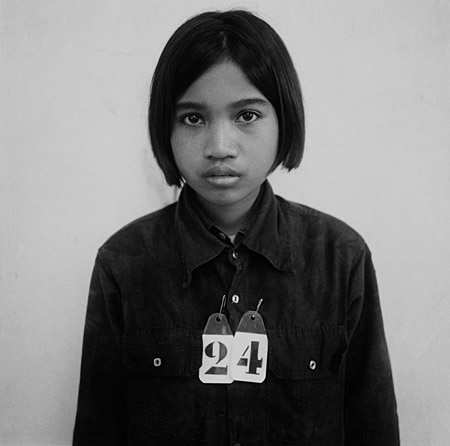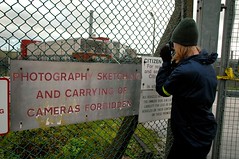Out From Behind a Camera at a Khmer Torture House
When I read this I have very mixed emotions, looking at images of people who were tortured just after they had their photo taken. Most look as if they are posing for the family album, but they dont smile, others look afraid...and others have been tortured! (Lifespy)
NYTimes story here
the photos are here
PHNOM PENH, Cambodia, Oct. 25 — He had a job to do, and he did it supremely well, under threat of death, within earshot of screams of torture: methodically photographing Khmer Rouge prisoners and producing a haunting collection of mug shots that has become the visual symbol of Cambodia’s mass killings
“I’m just a photographer; I don’t know anything,” he said he told the newly arrived prisoners as he removed their blindfolds and adjusted the angles of their heads. But he knew, as they did not, that every one of them would be killed.
“I had my job, and I had to take care of my job,” he said in a recent interview. “Each of us had our own responsibilities. I wasn’t allowed to speak with prisoners.”
That was three decades ago, when the photographer, Nhem En, now 47, was on the staff of Tuol Sleng prison, the most notorious torture house of the Khmer Rouge regime, which caused the deaths of 1.7 million people from 1975 to 1979.
This week he was called to be a witness at a coming trial of Khmer Rouge leaders, including his commandant at the prison, Kaing Geuk Eav, known as Duch, who has been arrested and charged with crimes against humanity.
The trial is still months away, but prosecutors are interviewing witnesses, reviewing tens of thousands of pages of documents and making arrests.
As a lower-ranking cadre at the time, Mr. Nhem En is not in jeopardy of arrest. But he is in a position to offer some of the most personal testimony at the trial about the man he worked under for three years.
In the interview, Mr. Nhem En spoke with pride of living up to the exacting standards of a boss who was a master of negative reinforcement.
“It was really hard, my job,” he said. “I had to clean, develop and dry the pictures on my own and take them to Duch by my own hand. I couldn’t make a mistake. If one of the pictures was lost I would be killed.”
But he said: “Duch liked me because I’m clean and I’m organized. He gave me a Rolex watch.”
Fleeing with other Khmer Rouge cadres when the government was ousted by a Vietnamese invasion in 1979, Mr. Nhem En said he traded that watch for 20 tins of milled rice.
Since then he has adapted and prospered and is now a deputy mayor of the former Khmer Rouge stronghold Anlong Veng. He has switched from an opposition party to the party of Prime Minister Hun Sen, and today he wears a wristwatch that bears twin portraits of the prime minister and his wife, Bun Rany.
Last month an international tribunal arrested and charged a second Khmer Rouge figure, who is now being held with Duch in a detention center. He is Nuon Chea, 82, the movement’s chief ideologue and a right-hand man to the Khmer Rouge leader, Pol Pot, who died in 1998.
Three more leaders were expected to be arrested in the coming weeks: the urbane former Khmer Rouge head of state, Khieu Samphan, along with the former foreign minister, Ieng Sary, and his wife and fellow central committee member, Ieng Thirith.
All will benefit from the caprice of Mr. Nuon Chea, who complained that the squat toilet in his cell was hurting his ailing knees and was given a sit-down toilet.
Similar toilets are being installed in the other cells, said a tribunal spokesman, Reach Sambath, “So they will all enjoy high-standard toilets when they come.”
It is not clear whether any of the cases will be combined. But even if the defendants do not see one another, their testimony, harmonious or discordant, will put on display the relationships of some of the people who once ran the country’s killing machine.
In a 1999 interview, Duch implicated his fellow prisoner, Mr. Nuon Chea, in the killings, citing among other things a directive that said, “Kill them all.”
Mr. Nhem En’s career in the Khmer Rouge began in 1970 at age 9 when he was recruited as a village boy to be a drummer in a touring revolutionary band. When he was 16, he said, he was sent to China for a seven-month course in photography.
He became the chief of six photographers at Tuol Sleng, where at least 14,000 people were tortured to death or sent to killing fields. Only a half dozen inmates were known to have survived.
He was a craftsman, and some of his portraits, carefully posed and lighted, have found their way into art galleries in the United States.
Hundreds of them hang in rows on the walls of Tuol Sleng, which is now a museum, their fixed stares tempting a visitor to search for meaning here on the cusp of death. In fact, they are staring at Mr. Nhem En.
The job was a daily grind, he said: up at 6:30 a.m., a quick communal meal of bread or rice and something sweet, and at his post by 7 a.m. to wait for prisoners to arrive. His telephone would ring to announce them: sometimes one, sometimes a group, sometimes truckloads of them, he said.
“They came in blindfolded, and I had to untie the cloth,” he said.
“I was alone in the room, so I am the one they saw. They would say, ‘Why was I brought here? What am I accused of? What did I do wrong?’”
But Mr. Nhem En ignored them.
“‘Look straight ahead. Don’t lean your head to the left or the right.’ That’s all I said,” he recalled. “I had to say that so the picture would turn out well. Then they were taken to the interrogation center. The duty of the photographer was just to take the picture.”











